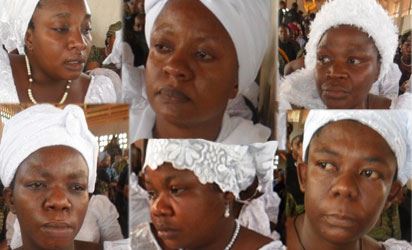1,000 WIDOWS TO BE MARRIED OFF IN NIGERIA.
Jan 21, 2015
Story

In the last two weeks some state governments in Nigeria have been responding especially to issues of women widowed as a result of Boko Haram bomb attacks which rocked some states in the Northern part of Nigeria in recent times.
One of the most interesting responses proposed to support the widows was the plan of the Kano state (A state in the Northern part of Nigeria) government to marry off 1,000 widows anytime from now. The reason for this plan is twofold; to ensure sustainable peace and reduce social tension and to make young men become more responsible to themselves and to the society.
On hearing this announcement several questions came to my mind in a flurry! Where will the government get 1,000 men to marry 1,000 widows? Will the marriages be in the best interests of the widows? What procedure will the government adopt to get the women married? Is it going to be by matchmaking? Will the women be allowed to freely choose any man they want? Are the women psychologically ready to remarry? Will the rights of the women to remain single be violated? These and many more questions continue to bombard my mind for answers.
It is not in doubt that the government meant well for the women but to simply assume that marrying off the widows is the answer to the social challenges that the Boko Haram violence has created is definitely trivializing the issue. In the Northern part of Nigeria, widows are encouraged to get married immediately after the demise of their husbands as a means of social security but this is mostly common among the Muslims in that part. Some of the affected widows in Kano state are not Muslims and as a matter of fact some of them are from the eastern part of Nigeria and it is a taboo for a widow from that part to remarry immediately after the death of her husband. She is expected to go through some dehumanizing widowhood rites such as, shaving off her hair, staying on the floor for several days without taking her bath or drinking the water used to wash the corpse of her husband and so on. Though, these dehumanizing cultural practices are almost going into extinction as a result of years of women’s rights advocacy and enactment of laws criminalizing such acts, nevertheless, a widow is still expected to mourn her husband by keeping away from men for at least a year before considering remarriage.
It is therefore very important that the modalities and procedures which the Kano state government intends to adopt to achieve this plan must be made public. If all the questions put forward above are not answered in a way consistent with the fundamental rights enshrined in the Nigerian constitution and the various women’s rights conventions ratified by Nigeria, marrying off the women may be counterproductive. It could exacerbate the already tensed situation in the country and worst of all jeopardize the attainment of the Millennium Development Goal (MDG) number 3 of gender equality and women’s empowerment.
Remarriage should not be the priority now. This is a time when the harrowing experiences of losing their husbands are still very fresh in their memories. What should be the most important first steps to supporting the women is what Governor of Anambra state ( a state in the Eastern part of Nigeria), Peter Obi did, when he took up the burial expenses of the deceased, gave One million Naira (approximately $6,500) each to the widows and gave scholarships to their children. This is a very important step to help the widows cope with breadwinning responsibilities which they are now constrained to take up. It is after these first steps that the issue of remarriage may be considered.
I commend the efforts of the government in recognizing the challenges the widows are facing and for responding swiftly but it will be better for the government to consult with the women to actually know their priority needs before embarking on such marriages which if not carefully handled could further devastate the already battered psyches of the women.




